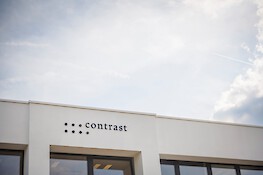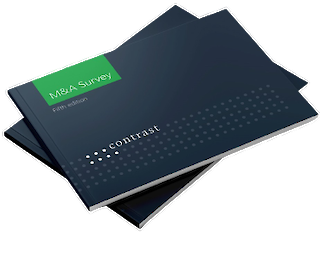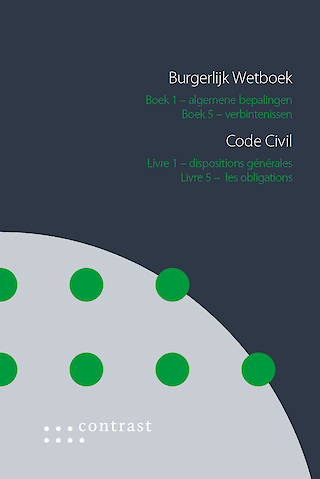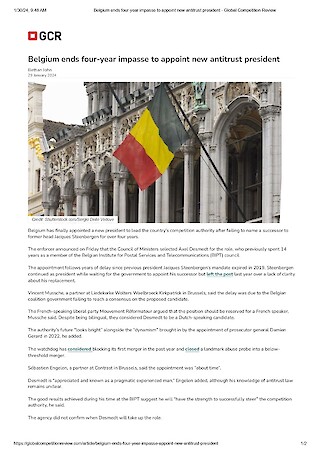In the Picture

Do I have to notify my joint venture (and if so, where)?
November 2020Imagine…
You have just been made managing director of a successful webshop that is specialised in the sale of high-end sports equipment. The webshop has its registered office and distribution centre in Belgium, from which the equipment is sold to sports enthusiasts throughout the European Union.
Together with one of your suppliers - another Belgian company - you are thinking about setting up a joint venture to produce sports equipment yourself and then sell it via your webshop.
The discussions have been going well and you ask your in-house counsel to draw up a joint venture agreement. The latter points out to you that you will also have to take merger control into consideration. It is possible that you will only be able to start up the joint venture after you have notified it to the competition authorities and obtained their approval.
Your in-house counsel and the financial department will examine in which countries such notification has to be done. You are genuinely surprised by this. Surely the answer is obvious: both of the companies are Belgian, so the only necessary notification would be in Belgium, right? Or . . . perhaps not?
A brief clarification.
If a transaction is subject to merger control, the parties have to notify it to the competent competition authorities. They may not actually carry out the transaction until they have received the approval of the authorities. If they simply ignore the obligation to notify, or implement the transaction before having received approval, there is a good chance they will be hit with a stiff fine.
Merger control comes in all shapes and sizes. This applies for both the type of transactions that have to be notified and for the applicable turnover thresholds.
In Belgium, the rules on the types of transaction that have to be notified are largely aligned with those of the EU. Along with typical mergers and acquisitions, certain joint ventures also have to be notified. This is the case for “fully-functional” joint ventures that are active on the market on a long-term and independent basis. If production is the only activity the joint venture engages in, and its products are then marketed by the parent companies, a notification is generally not required, given the joint venture’s lack of independent access to the market.
Thus, in our example it is unlikely that the joint venture is subject to the obligation to notify in Belgium, since it will not be selling the products on the market itself - that will be handled by the webshop of a parent company.
However, in certain EU Member States - such as in Austria, Germany and Poland - the full functionality rule does not apply, so it is always important to check the local concentration control rules.
The differences between the EU Member States are greater with regard to the turnover thresholds. Concentrations that exceed the EU turnover thresholds only have to be approved by the European Commission, so the one-stop-shop principle applies here: approval by the Commission is approval for the entire EU. As a rule, however, the Commission only investigates large-scale transactions: the parties involved must achieve a worldwide turnover of more than 5 billion euros, and each of them individually at least 250 million euros in the EU. Alternatively, the involved parties must achieve a worldwide turnover of more than 2.5 billion euros while each of them has substantial turnover in at least three Member States.
If the EU turnover thresholds are not exceeded, one must examine - Member State by Member State - whether the national turnover thresholds are exceeded, which entails that the turnover of the parties has to be geographically allocated.
That is sometimes easier said than done, however, since the allocation does not depend on the location of the registered office of the companies involved. The place where the turnover is actually realised is decisive, and that is the place where the characteristic action of the contracts that the company concludes occurs. For sales, that is basically the country where the buyer is established. In the case of the creation of a joint venture, this exercise must be conducted for the turnover of both parent companies.
In our example, therefore, it is not the case - as the manager thought - that all of the turnover is “Belgian” turnover. It might well be that the joint venture must be notified in e.g. Poland if both of the parent companies have a substantial number of Polish customers.
Within the ECN (the European Competition Network, the network of European competition authorities), the national competition authorities exchange information about concentrations that have to be notified in several Member States. This underscores the importance of doing a thorough analysis of the obligation to notify.
Concretely:
- First check whether a transaction is a "concentration" within the meaning of the EU merger control rules. This is especially important in connection with the creation of joint ventures.
- Then verify whether the EU turnover thresholds are exceeded.
- If yes, there is a one-stop shop: approval of a concentration by the European Commission applies for the entire EU.
- If the response to the first or the second question is no, one has to examine for every Member State whether the transaction is a concentration, and whether the national notification thresholds are exceeded.
- The proper geographic allocation of turnover is a must, and multiple national notifications cannot be excluded.
Want to know more?
- For information on the geographic allocation of turnover, see the Commission Consolidated Jurisdictional Notice under Council Regulation (EC) No 139/2004 on the control of concentrations between undertakings (paragraphs 195 – 203).











